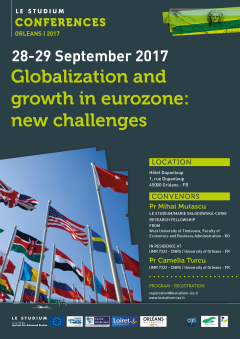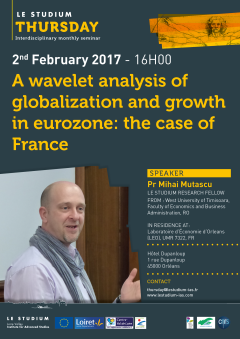Prof. Mihai Mutascu

From
West University of Timisoara, Faculty of Economics and Business Administration - RO
In residence at
Laboratoire d'Économie d'Orléans (LEO), University of Orléans / CNRS - FR
Host Scientist
Prof. Camelia Turcu
PROJECT
A wavelet analysis of globalization and growth in euro zone
The research proposal addresses a key and up-to-date euro zone economic issues, namely the link between globalization and economic growth. In the last years, on the ground of the economic and financial openness acceleration, the euro zone got confronted with different severe challenges, such as: the financial and economic world crisis, so called the Great Recession (Global Financial Crisis) and Euro crisis (debt and banking crisis). Additionally, other challenges might affect, in the future, the euro zone economies through international economic transmission channels: the Middle East conflict with high implications on oil price or the Chinese economic rebound.
Thus, the main target of the project is to explore the relationship between globalization and economic growth, in the case of euro zone, by using the wavelet tool. In order to illustrate any 'common' features in the euro zone regarding the behaviour of 'globalization-growth' nexus, a comparison between country wavelet spectra will also be done.
The theoretical background of the relationship between globalization and economic growth is mixed. Two directions of approach can be identified: globalisation leads to growth and growth leads to globalization, respectively.
We expect our results to confirm both assumed hypotheses, revealing that there is a bi-directional causality between globalization and economic growth, with different signs, but which is valid only for particular sub-periods of time. These 'heterogeneous' outputs derive from the used tool, period of investigation and dataset frequency, as we investigate the series both in time and frequency.
The joint conducted analysis of country wavelet spectra on all Eurozone countries will give interesting information about policy implications. The euro zone governments should focus more their attention to the connection between globalization and growth, as this pair has different reactions, varying across periods and/or sub-periods of time, economic cycles and geo-political world contexts.
Publications
Final reports
The paper investigates the interaction between the trade and business cycle synchronization, using an extended wavelet approach. The analysis is conducted in several Eurozone countries, for the period 1960Q1-2016Q2. We show that the trade promotes economic synchronization in the considered Eurozone countries, on medium and long terms. The key ingredients are economic integration and monetary union. A reversed connection is also distinguished. On medium and long terms, a low degree of synchronization accelerates trade only if the given country has an ascending growth trend. Several different scenarios are found on short term, for particular economic contexts.


